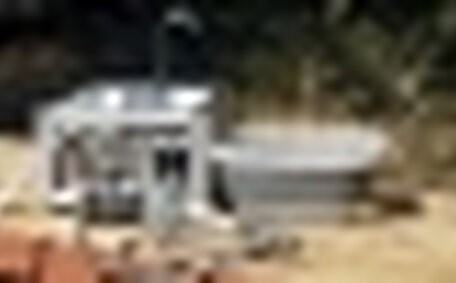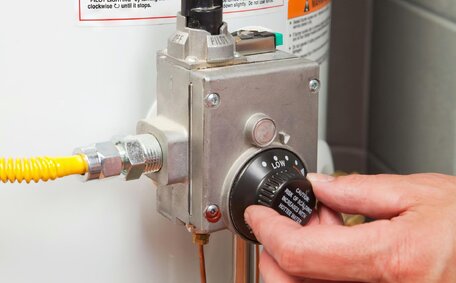How Tankless Water Heaters Operate
Tankless water heaters provide hot water on demand, bypassing the need for a conventional storage tank.
When a hot water tap is turned on, cold water travels into the unit and is immediately heated by a heat exchanger. This heat exchanger swiftly heats the water, delivering it directly to your tap and ensuring a constant hot water supply.
Gas tankless water heaters use natural gas and a pilot light to efficiently heat water via the heat exchanger. Gas-fired tankless water heaters typically offer higher flow rates, averaging about 19 litres per minute, and are more energy-efficient in heating. Conversely, electric tankless water heaters generally provide lower flow rates, approximately 7-11 litres per minute.
Without a storage tank, tankless heaters offer a consistent flow of hot water, a distinct advantage over traditional models.
Benefits of Tankless Water Heaters
Tankless water heaters offer several key advantages compared to traditional storage tank models:
Energy efficiency - Due to their on-demand operation, tankless heaters avoid the standby heat losses of traditional hot water tanks, which regularly reheat water. This efficiency can lead to energy bill reductions, with some units achieving over 30% more efficiency than tank-style heaters.
Long lifespan - With proper upkeep, tankless hot water systems can last beyond 20 years and are frequently included in home warranties. Thanks to replaceable components, tankless water heaters are known for their notably extended lifespans.
Continuous hot water - Tankless heaters provide endless hot water on demand, as they heat water directly without a limited storage capacity.
Space saving - Tankless models occupy roughly a quarter of the space required by traditional units, freeing up significant space in your home.
Environmentally friendly - Higher efficiency means less energy wasted and lower carbon emissions.
Instant Hot Water
One of the biggest benefits of heaters tankless is that they provide instant heat on demand. Continuous flow heating from tankless systems ensures hot water is available when needed, even during power outages.
There’s no waiting time for a storage tank to slowly heat up or reheat between uses. The moment you engage your hot water tap, most tankless systems ensure that water flows out hot in an uninterrupted stream.
While tank-style heaters may deplete their hot water reserve, tankless models deliver a steady stream upon demand.
Tankless heaters, with their capability to instantly heat water, provide an efficient and convenient solution for your household’s hot water needs.
Energy Efficiency and Cost Savings
A major financial advantage of installing tankless water heaters is the potential for energy and cost savings over traditional tank models.
Research suggests tankless water heaters are 24-34% more efficient than their storage counterparts on average. The reduction in standby energy wastage can help households save on their annual energy bills.
When considering going tankless, it’s important to note the initial cost may exceed $1,000. However, the system can offset this through energy savings within 5-10 years. After this point, a tankless heater will continue providing ongoing annual savings.
Space Savings
Tankless heaters are about the size of a carry-on suitcase and can be mounted on a wall. This compact size frees up valuable floor space compared to a large, bulky storage tank water heater.
The small footprint of tankless units makes them ideal for smaller homes, apartments, or anywhere space is limited. Their size lends flexibility in positioning, allowing installation in closets, utility rooms, attics, and other tight spots that couldn’t accommodate a full-sized water heater tank.
In addition to conserving physical space, tankless heaters avoid the need for multiple units, efficiently supplying hot water throughout the home.
For those with limited space, tankless water heaters offer an efficient and compact alternative to traditional hot water systems without occupying valuable real estate in your home.
Their size lends flexibility in positioning, allowing installation in closess
There are several key factors to consider when deciding between a tankless or traditional storage water heater for your home:
Hot water demand - Evaluate if your household’s peak hot water demand can be met by the tankless heater’s flow rate capacity. Gas tankless heaters typically provide 3-5 gallons per minute (gpm), whereas electric models range from 1-2 gpm.
Climate - In colder climates, an electric tankless model’s flow rate may drop in the winter when incoming water is very cold. Gas tankless handles cold water input better.
Fuel source - Tankless gas heaters boast higher flow rates. Make sure you have access to gas water sources or can install propane. Electric tankless can work anywhere with sufficient electrical capacity.
Electrical service - Multiple units may require upgraded wiring and panels to manage the water supply and electrical load effectively. Check your main service capacity.
Venting - Gas tankless venting has special requirements. Make sure your home layout accommodates necessary venting.
Space - Condensing models are more compact but may require outdoor installation, while flow needs may restrict the use of manifold systems with multiple units.
Upfront Cost
A drawback of tankless water heaters is their higher initial cost for purchase and installation when compared to traditional tank models.
The initial expense for a tankless unit can vary from $1,000 to $4,000, depending on its size, fuel type, efficiency, and features. Installation costs also vary based on the complexity of integrating the unit with your existing plumbing and ventilation system.
In some cases, installing multiple tankless units to meet the hot water demand of larger households further increases cost. Additionally, the requirements for upgraded gas lines and electrical infrastructure to accommodate tankless units can increase the total investment.
While tankless heaters have higher upfront costs, these can usually be recouped over time as households save money through energy savings and lower operating costs. It’s crucial to balance the long-term advantages with the upfront cost to determine if a tankless water heater is the right investment for your home.
Ongoing Maintenance
The pros and cons of tankless heaters suggest that Despite needing less upkeep than tank-style units, regular maintenance is key to ensure lasting hot water performance.
To keep your tankless system running efficiently, follow these maintenance tips:
Limitations on Hot Water Flow Rate
While tankless water heaters provide a continuous supply of hot water, their flow rate capabilities can be limited in some situations.
Tankless heaters have a maximum flow rate, usually around 2-5 gallons per minute for residential units. Using several hot water outlets at once can strain tankless heaters, potentially causing a drop in water temperature consistency.
When hot water is used simultaneously at a shower and a kitchen tap, it may lower the temperature, a drawback not usually faced with storage water heaters.
To ensure a water heater can supply hot water sufficiently for larger homes with high demand, several tankless units may be necessary. These requirements can increase upfront costs, but efficient plumbing strategies, such as staggering the use of hot water taps, can keep the system running within its flow rate limits.
Installation Requirements
A tankless water heater installation needs meticulous planning and must be executed by a licensed, professional plumber. There are several key factors to consider for proper installation:
- Make sure your home has the appropriate fuel source available. Gas tankless heaters require natural gas or propane lines. Electric models need adequate electrical capacity and may require new wiring and panels.
Venting - Gas tankless heaters require proper venting to the outside. The venting path must meet length and clearance codes and avoid obstructions.
Permits - You will need permits from your local building department for installing a water heater. All codes and regulations must be followed.
Multiple Units - Large homes may require multiple tankless units to meet hot water demand. It’s essential to have the correct manifold plumbing configurations and controls in place for multiple units.
A tankless water heater installation needs meticulous planning and must be executed by a licensed, professional plumber.
Maintenance Tips for Tankless Systems
To maintain peak efficiency of your tankless water heater, follow these essential maintenance practices:
Regular upkeep not only ensures optimal functioning of tankless systems but can also extend their service life.
Are Tankless Water or gas upgrades to accommodate tankless systems may incur higher costs.
Although tankless heaters are energy-efficient, the long-term cost-effectiveness depends on your family’s specific hot water consumption patterns. Balance the efficiency improvements with your budget to decide if the initial investment in a tankless heater is worthwhile.
Are Tankless Water Heaters Right for You?
Tankless water heaters are particularly suitable for smaller households with moderate hot water needs. However, larger residences or homes needing electrical or gas upgrades to accommodate tankless systems may incur higher costs.






